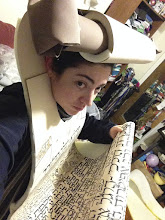 It seems obvious once you think about it, but it hadn’t occurred to me before. Mary Poppins, filled as it is with childlike whimsy, even as it turns the lives of tots Jane and Michael topsy-turvy and catalyzes the wind change that brings their family together, doesn’t set out to alter the children’s nature. Ms. Poppins may introduce chaos wherever she goes, but the mayhem unnerves no one the way it unsettles the story’s true protagonist: Mr. Banks.
It seems obvious once you think about it, but it hadn’t occurred to me before. Mary Poppins, filled as it is with childlike whimsy, even as it turns the lives of tots Jane and Michael topsy-turvy and catalyzes the wind change that brings their family together, doesn’t set out to alter the children’s nature. Ms. Poppins may introduce chaos wherever she goes, but the mayhem unnerves no one the way it unsettles the story’s true protagonist: Mr. Banks.Played with meticulous British rigor by David
T
 omlinson, Mr. Banks is the only character to change significantly throughout the film. While he transforms from a brusque and exacting master of the house to a father eager to celebrate his children’s fleeting youth, Mary Poppins moves on, claiming (I’ve tried and failed not to overthink this; either Mary is a cold-hearted so-and-so or a big fat liar) that she feels no emotion whatsoever towards Jane and Michael. What would become of her, she muses, if she loved all the children to come under her care? (This, aside from the inability to perform magic, is the reason I could never be Mary Poppins. Or a teacher.)
omlinson, Mr. Banks is the only character to change significantly throughout the film. While he transforms from a brusque and exacting master of the house to a father eager to celebrate his children’s fleeting youth, Mary Poppins moves on, claiming (I’ve tried and failed not to overthink this; either Mary is a cold-hearted so-and-so or a big fat liar) that she feels no emotion whatsoever towards Jane and Michael. What would become of her, she muses, if she loved all the children to come under her care? (This, aside from the inability to perform magic, is the reason I could never be Mary Poppins. Or a teacher.)Meanwhile, the household a
 t large changes only in that it grows more light-hearted. Jane and Michael delight in the antics provided for their amusement. The domestics, having never previously tolerated each other, sing in the kitchen. And Mrs. Banks prioritizes her family over the Votes for Women rallies that the movie dismisses as frivolous (“You know how the cause infuriates Mr. Banks,” she babbles). If we weren’t focusing on Mr. Banks here, this would be the perfect place to launch into a feminist critique of the film: it takes a tantalizingly borderline sexualized pixie woman’s magical touch, the narrative says, to draw a gruff father with his nose stuck in meaningless numbers back to the earth- and hearth-bound concerns of his home and family, and back to the women-and-children’s realm of the supernatural. Yep; good thing we’re not getting into that.
t large changes only in that it grows more light-hearted. Jane and Michael delight in the antics provided for their amusement. The domestics, having never previously tolerated each other, sing in the kitchen. And Mrs. Banks prioritizes her family over the Votes for Women rallies that the movie dismisses as frivolous (“You know how the cause infuriates Mr. Banks,” she babbles). If we weren’t focusing on Mr. Banks here, this would be the perfect place to launch into a feminist critique of the film: it takes a tantalizingly borderline sexualized pixie woman’s magical touch, the narrative says, to draw a gruff father with his nose stuck in meaningless numbers back to the earth- and hearth-bound concerns of his home and family, and back to the women-and-children’s realm of the supernatural. Yep; good thing we’re not getting into that.
Mary Poppins merits a repeat viewing just to witness Dick Van Dyke’s remarkable agility for yourself; you’ve heard his virtues extolled before, but no description can do his flailing limbs and unfaltering grin justice. You’ve also heard his Cockney accent maligned to no end, but Van Dyke’s positively elastic performance as Bert far outshines his shortcomings. (One has to wonder about Bert’s relationship with Poppins; with the two obviously at ease in each other’s company between long absences, does she have a Bert in every town?) The unflappable Julie Andrews, for her part, gives the most empathetic possible interpretation of Mary Poppins, a character whose two-faced callousness renders her borderline cruel at worst and an enigmatic feminine tease at best.
The enigma of Mary Poppins is what ensnares and ultimately pushes Mr. Banks to his furious limit. After failing to fire Mary Poppins, taking his children on an outing that leads to his getting sacked, and coming home to find himself playing host to a band of filthy chimney sweeps, Mr. Banks would be right to trace his troubles back to the perplexing nanny. (Incidentally, the bankers firing Mr. Banks has become my favorite scene; the gasp of “No, not that!” preceding the ceremonious inverting of his umbrella gets me every time.) Only a dejected chat with Bert, followed by the last-act innocence of his children – handing their father back the tuppence that led to his sacking – finally pulls him out of his dark frustration and back over the supercalifragilisticexpialidocious edge.
Mary Poppins isn’t even present for Mr. Banks’s metamorphosis; she merely sets the wheels in motion for his change to come from within. After manipulating everyone within her reach, letting the madness build to this act of mercy – to the wind change in the Banks household – is the least she can do. Watch this movie again, but prepare to justify much of it to yourself along the way.




